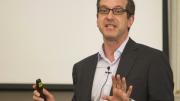The University announced today that the Pershing Square Foundation—founded by Bill (William A.) Ackman ’88, M.B.A.’92, CEO of Pershing Square Capital Management, and Karen Ackman, M.L.A. ’93—has donated $17 million to “catalyze” a “foundations of human behavior” initiative aimed at exploring “the psychological, social, economic, and biological mechanisms that influence human behavior” and applying the discoveries to devise “mechanisms for improving human well-being.” The gift endows three professorships and a $5-million research fund.
Separately, in an interview with the Wall Street Journal, the Ackmans disclosed that their gift includes an additional $9 million: $4 million to endow a chair in global health at Harvard Medical School, and $5 million for the men's crew team (Ackman rowed as an undergraduate)—at least in part to allow all crew members to travel to Florida for spring training.
The behavioral initiative, led by Goldman professor of economics David Laibson, has been referred to in a University publication, but not described extensively so far (there is no initiative website or link in the provost’s list of interfaculty initiatives). During the launch of the Faculty of Arts and Sciences (FAS) capital campaign last October, Laibson chaired a panel touching on some of the fields likely to be involved; he spoke of
an amazing moment for the behavioral sciences—the insights, the interdisciplinary scholarship, the collaboration, the breakdown of initial silos, the incorporation of genomics, biology, neuroscience. It is transformative in the classroom, it is transformative in the workplace, and it is changing the world. Policymaking around the globe is influenced by these ideas now in ways that are rewriting the rules of regulation and the way policymakers conduct their affairs.
He also addressed the problem of self-regulation—the struggle humans have with themselves to act on their intentions instead of giving in to temptations—and the way humans sometimes fail to build good social institutions that help society achieve certain goals.
As the panel and his remarks suggest, Laibson is a behavioral economist (see Harvard Magazine’s feature, “The Marketplace of Perceptions,” for an overview of the field and of some of Laibson’s work); that discipline appears to be shaping the newly funded initiative, which is described in the news release as addressing “the basic mechanisms that influence human behavior,” enabling researchers “to identify cost-effective, scalable solutions to societal challenges in areas ranging from healthcare and economic development to education and government.” Among the fields involved, according to the news release, are “the psychological, social, economic, and biological mechanisms” that influence behavior. The research is expected to embrace “a wide range of important cognitive, social, and behavioral phenomena—from decision making, self-control, addiction, altruism, reciprocity, cooperation, herding, and violence, to productivity, innovation, and leadership.”
Updated with the addition of this new paragraph April 15, 2014, 8:00 a.m. A Gazette article published late on April 14 provides this further detail on the initiative's work:
“How do we help people who want to quit smoking?” Laibson asked. “How do we help people save for retirement? How can we reduce domestic violence? How can we make people more productive at work, or learn more in school? What we’ve discovered over the last 10 years is that a lot of behaviors are malleable, and can be influenced at remarkably little cost.
“We’re very excited about the dual challenge of making basic scientific breakthroughs, and then applying those breakthroughs to pressing social problems,” he continued. “What we’re doing with the Foundations of Human Behavior Initiative is creating the optimal sandbox for that extraordinary research to take place.”
According to the news announcement, “psychological economist” Matthew Rabin—a leading behavioralist who is Jordan professor of economics at the University of California, Berkeley, and whose decision to move to Harvard was recently made known within the profession—will become the first Pershing Square professor effective this July. (He was a visiting professor at Harvard in 2004, and, the Crimson reported, received a tenure offer then.)
Beyond the intrinsic interest that broad agenda holds, the initiative is the first of the specific academic programs alluded to by FAS dean Michael D. Smith for which funding has been disclosed as a result of The Harvard Campaign. (He has mentioned a “big-data” initiative and an initiative on the science of the human past, applying biology and other disciplines to historical research.)
In the news announcement, Smith said of the initiative and the Ackmans' gift:
David Laibson and other members of the Foundations of Human Behavior Initiative are asking fundamental questions about virtually every aspect of human existence and society. Their research reaches across a score of different disciplines at Harvard—from economics to the life sciences—and is directly relevant to how we live today. Not only will this gift support that important scholarship through the creation of new professorships, but it will also, through the new venture fund, create opportunities for graduate students to engage directly with faculty on these important research projects.
Of the gift, Bill Ackman said, “Understanding the foundations of human behavior is a key to improving people’s health, wealth, and security around the globe. We are inspired by the potential of Harvard’s initiative.”
According to its website, Pershing Square Foundation has supported social investment enterprises aiming to alleviate rural poverty in Latin America and Africa; arts programs such as New York City’s High Line park (Karen Ackman, a landscape architect, is a board member) and Signature Theatre Company; and human-rights activities such as Human Rights Watch and a program to exonerate wrongfully convicted individuals. It has also underwritten cancer research. The Harvard announcement says the foundation has made $235 million in grants and social investments since it was organized in 2006. (The William A. Ackman Fund for Holocaust Studies previously helped support Harvard-based economic research on the long-term effects of the Holocaust, according to a Harvard Gazette report.)
Pershing Square Capital Management, launched a decade ago with $54 million in capital, now invests more than $13 billion, the Wall Street Journal recently reported. It is an unusual hedge fund, taking enormous positions in a small number of companies, sometimes holding on to them for many years, and then, as an “activist investor,” attempting to induce or to profit from significant change in those enterprises—a strategy that can involve large risks and returns, and makes Ackman a singularly high-profile member of the elite hedge-fund community. The strategy—sometimes involving political and regulatory investigations of the companies involved (as in public examinations of MBIA, a bond insurer whose stock Ackman sold short before he launched Pershing Square)—is not for the faint of heart.
Ackman famously acquired a significant ownership stake in J.C. Penney, the retailer, and as a board member, helped bring in Apple’s former head of retailing to remake the stores completely; that strategy alienated customers, led to a sharp decline in sales, and prompted Penney to install new management. Ackman resigned from the board last summer and sold Pershing’s entire stake, reportedly at a large loss.
Of late, Pershing Square has taken a huge short position in Herbalife, the multilevel-marketing nutrition and weight-loss company, and has aggressively pressed the case that it is a classic pyramid-sales operation. The company and other investors (including Carl Ichan, George Soros, and Daniel Loeb) have fought back, arguing that it is sound and legitimate. Pershing Square has attracted attention for briefing members of Congress to interest them in investigating Herbalife, and pushing for Federal Trade Commission and other investigations as well. According to recent reports, the FBI has been querying Herbalife distributors about their work. Pershing Square’s protracted campaign to make its short position pay off was the subject of a detailed New York Times dispatch last month.
Not all investors have the tolerance for such strategies. Over the long term, it has obviously been profitable for Ackman and his investors. The gift, made for Bill Ackman's twenty-fifth reunion last year (happily, Laibson is also a member of the class of 1988), according to this morning's Wall Street Journal article, underscores his instinct for value and timing: the four newly endowed professorships reflect the $4-million threshold then in effect; the Corporation has apparently recently raised that minimum to $5 million for new chairs.
Read the news announcement here.










